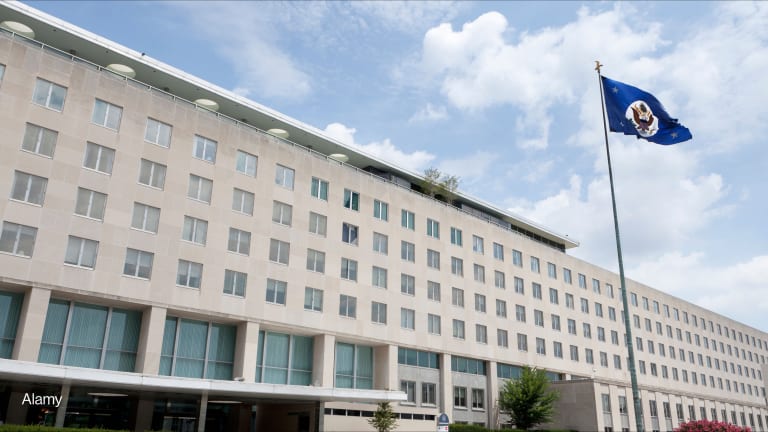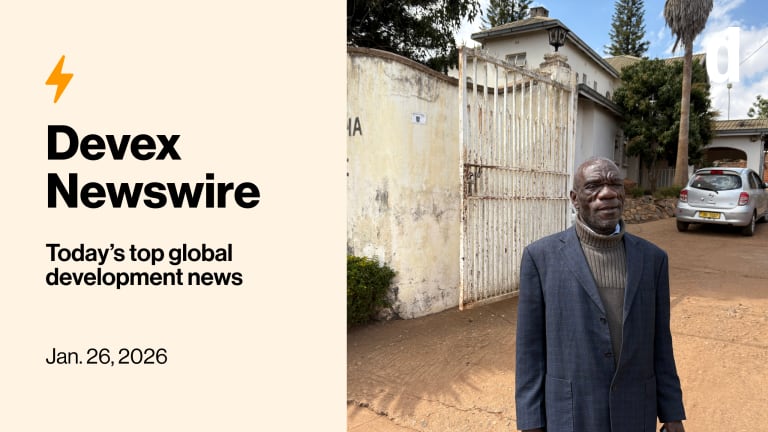Humanitarian aid is often immune to politically motivated cuts. Not in the Northern Triangle.

WASHINGTON — When the United States decides, for any number of political or strategic reasons, to restrict funding to a particular country, it most often allows for an exception for humanitarian aid. But that is not the case with U.S. funding to the Northern Triangle countries of Guatemala, El Salvador, and Honduras.
In March, President Donald Trump announced that he would cut off aid to the Northern Triangle countries, demanding that the three countries’ governments stop citizens from leaving for the U.S.
“We’re extremely concerned in this case that humanitarian assistance has been lumped in with other assistance to accomplish a policy objective.”
— Bill O’Keefe, executive vice president for mission and mobilization, Catholic Relief Services.Devex spoke with several development experts, none of whom could remember a time when the U.S. government had cut all assistance, including humanitarian aid, to this extent as a result of a political decision.
Even North Korea, one of America’s chief political adversaries, receives humanitarian aid due to an exemption, said Justin Fugle, head of policy at Plan International USA.
“It’s just very normal to do a humanitarian exemption,” he said.
There are a number of other examples of situations where, despite political tension between governments, humanitarian aid has continued to flow, including when millions in Zimbabwe were fed by U.S. aid programs even as the U.S. was putting pressure on Zimbabwe’s former president Robert Mugabe for his assault on human rights and the rule of law, according to the State Department.
More on US funds to Cenral America
► More info on possible rescission expected next week, USAID chief of staff says
► Following review, US 'will not provide new funds' to Central America
► 'Rescission by another name.' Trump move sparks questions for implementers
In the midst of the Cold War 1980s, the U.S. was at odds with the Ethiopian government. But despite that, when Ethiopia was struck by horrible drought and famine, the U.S. government provided humanitarian aid despite not supporting the government, said Bill O’Keefe, executive vice president for mission and mobilization at Catholic Relief Services.
When the U.S. government wants to change how it delivers assistance to a country for security or political reasons, it typically has three choices: restrict funding to the government of a country, restrict development funding that goes through NGOs or civil society, and restrict humanitarian assistance, he said.
“In our experience it is extremely unusual if not unprecedented to cut humanitarian assistance because of policy differences with other governments,” O’Keefe said. “We’re extremely concerned in this case that humanitarian assistance has been lumped in with other assistance to accomplish a policy objective.”
Many of the programs in the Northern Triangle that will no longer receive funding were working to address the underlying causes of migration and “putting a hold on all assistance runs the risk of exacerbating the humanitarian crisis,” said Jake Kurtzer, deputy director and senior fellow for the Humanitarian Agenda program at the Center for Strategic and International Studies.
“There is lots of concern in the development community about instrumentalizing aid.”
— Justin Fugle, head of policy, Plan International USABut this decision may not be final. Congress has already signaled that it wants the money it has appropriated for foreign aid to be spent and there is a long history of bipartisan support for humanitarian assistance, he said.
“I think Congress will assert itself,” Kurtzer said.
And Congress has already in some ways. In May, Democratic Rep. Eliot Engel and Republican Rep. Michael McCaul, leaders of the House Foreign Affairs Committee, introduced legislation that authorizes $577 million in foreign assistance to Central America to address the root causes of migration and prohibits those funds from being reprogrammed, rescinded, or transferred. And when the House of Representatives passed a foreign aid budget bill it included language that would make it more difficult for the administration to move funds around or choose to spend them differently.
“I think what’s happened here is the politics of the issue was such that the announcement was made to cut to all assistance without looking at [the] nature of specific programs and I think in time some of those programs will be reinstated,” Kurtzer said. “I think the humanitarian imperative and impetus override short-term political considerations that may be driving this decision.”
With the threat of rescission and little time before the start of the next fiscal year, O’Keefe said he doesn’t believe unspent 2018 funds will be allocated.
Only 60% of the funding approved by Congress for the region for fiscal years 2017, 2018 and 2019 has been programmed, O’Keefe said.
“The argument that’s sometimes made that the money is not working in addressing [migration] … doesn’t fly” because the U.S. hasn’t spent the money, he said.
And humanitarian needs are rising, O’Keefe said. For example, Guatemala has suffered through six years of recurring drought, which is worsening this year. U.S. funds that have been cut would go to emergency drought relief programs aimed at helping thousands of farm families avoid malnutrition, O’Keefe said.
At a human level, these funding cuts mean vulnerable families are suffering and not getting the assistance they need to survive and at a societal level those people may be forced to consider migrating, he said.
“Humanitarian assistance funding is about helping people who are suffering who have nothing to do with the political question of the day,” O’Keefe said. “Cutting assistance for political reasons is the wrong thing to do.”
Foreign aid shouldn’t be used as leverage to push a government to change a policy, that goes against humanitarian principles and away from the purpose of foreign aid, Fugle said.
“Plan and so many of us have been very concerned about using foreign aid for a purpose not driven by humanitarian or development purpose,” he said. “There is lots of concern in the development community about instrumentalizing aid.”
Search for articles
Most Read
- 1
- 2
- 3
- 4
- 5








